 Applications are now welcomed from businesses to Innovate UK’s Open competition for research and development for projects costing between £25k and £1m. Projects may last a maximum of three years and must be led by a UK business. An allocation of £19m has been made available for this fund but a further £10m is available for projects that are more suitable for a Knowledge Transfer Partnership. Research organisations can be eligible for up to 30% of eligible project costs so this is a great opportunity to work in collaboration with a business. If you are already working with a business on a novel/game-changing idea, and want to know more information, please contact Ehren Milner, Research Facilitator for Industrial Collaboration (emilner@bournemouth.ac.uk).
Applications are now welcomed from businesses to Innovate UK’s Open competition for research and development for projects costing between £25k and £1m. Projects may last a maximum of three years and must be led by a UK business. An allocation of £19m has been made available for this fund but a further £10m is available for projects that are more suitable for a Knowledge Transfer Partnership. Research organisations can be eligible for up to 30% of eligible project costs so this is a great opportunity to work in collaboration with a business. If you are already working with a business on a novel/game-changing idea, and want to know more information, please contact Ehren Milner, Research Facilitator for Industrial Collaboration (emilner@bournemouth.ac.uk).
Category / BU research
Catapult Researchers in Residence Programme
 The Catapult centres are a network of world-leading centres designed to help transform the UK’s capability for innovation in specific areas and drive future economic growth. To find out more, please visit this link.
The Catapult centres are a network of world-leading centres designed to help transform the UK’s capability for innovation in specific areas and drive future economic growth. To find out more, please visit this link.
To encourage increase in the connections between the UK research base and the Catapults, RCUK is supporting the development of new collaborations through research visits/ residencies for university (and other eligible research organisations) academics to spend time embedded within the Catapult teams through the Catapult Researchers in Residence (RiR) Awards. Please see a summary below of what this scheme offers:
Aims:
- Accelerate the impact of RC-funded research
- Increase knowledge exchange and co-creation between academia and Catapult centres
- Develop new collaborations between academia and Catapult centres
- Expand the capabilities and knowledge of the Catapults
- Nurturing talents and skills development of researchers and Catapult staff
- Create a cohort of RiRs able to share their experiences with a wider network of academics.
Funding:
- value of up to £50k (100% FEC); flexibly spread between one and four years.
- Funding awarded directly to the host university and not the Catapult.
- Funding to cover the salary costs for the visit of each RiR, travel and subsistence costs, and any consumables used at the Catapult.
Timeline:
The programme will run until March 2023, with two RiRs announcements of opportunity each year, with the last RiR opportunity announced in January 2019.
Current closing deadline is 23 March 2018; 5pm.
Eligibility:
- applicants must be employees of eligible organisation; must be resident in the UK
- EPSRC eligibility criteria apply
Please visit this link for more information on how to apply or speak to your Funding Development Officers.
SURE conference today – Student case study (Georgina Polius)
Georgina Polius is in her second year of BA Sociology and Anthropology in the Faculty of Health and Social Sciences, and is one of the students who has decided to participate in this year’s upcoming Showcasing Undergraduate Research Excellence (SURE) conference.
Georgina was encouraged to apply by her lecturer, Dr Rosie Read, who informed the entire class to participate in the SURE conference. “Initially, the word abstract scared me a bit because I would have to condense my work into a few lines but after further discussion with my family, I decided to go for it.”
Her assignment research looks at the underlying problem of food poverty within modern British society which was carried out within a foodbank in Bournemouth, working among the volunteers. “Having grown up in a volunteering culture, it has become for me a way of life,” says Georgina. “More specifically, my interest in the foodbank area was sparked by one of my course units I studied last semester where we were sent into the Bournemouth foodbanks to research the personal reasons behind the seemingly household phenomenon of volunteering.”
“I do believe that SURE is a good way to showcase our work as we, as students, have been given the opportunity for various academics and other students to see our work and receive unbiased feedback, which will help us to improve for the future. It also gives us a place to highlight real world issues.”
“I hope to use this exposure from SURE to improve my self-confidence and assertiveness in public speaking which would be an asset to me as I continue with my university studies and eventually into the world of research,” she says. “Most students would perhaps only get to publish their work or experience this type of exposure if they continued to a Master’s programme.”
The Showcasing Undergraduate Research Excellence conference will taking place on 7 March 2018. Many undergraduate students from across the university will be presenting their research throughout the conference in a variety of different ways, from presentations to posters and art installations. Please register via the Eventbrite page if you would like to attend.
For more details, visit the SURE website or email the SURE team.
The 10th Annual Postgraduate Research Conference – 1 Day to Go!

Click to Register.
CQR Seminar for this Wednesday cancelled
Sorry to inform you that this Wednesday’s ‘In Conversation’ CQR Seminar is cancelled due to illness.
Mark you diaries now, however, for the next Seminar on Wed. 11 April at 1 pm in RLH 208 presented by the ‘Gang of Four’.
Curious? More information will follow. Stay tuned!
Here are the Seminars for the rest of the academic year:
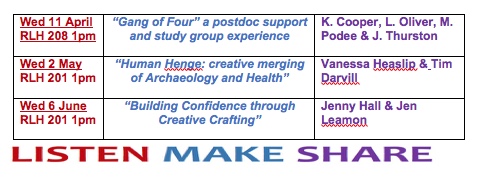

Review and changes to BU scheme to invest in research capacity for externally-funded projects with prestigious research funders
 The scheme to invest in research capacity for externally-funded projects with prestigious research funders was launched in August 2017 and has been revised in February 2018. The revised policy document can be found here or on the BU staff intranet under ‘policy/ research/ pre-award’.
The scheme to invest in research capacity for externally-funded projects with prestigious research funders was launched in August 2017 and has been revised in February 2018. The revised policy document can be found here or on the BU staff intranet under ‘policy/ research/ pre-award’.
The main changes are as follows:
- Applications to prestigious funders when BU is non-lead, i.e. Co-Investigator, will now be considered as long as the value threshold for BU income is met (see below). This is available for both pathways.
- The BU income value threshold for ECRs applying to external prestigious research funders has been lowered to £75k (before full economic costing (fEC)) for both pathways: PGR studentships and Postdoctoral research staff.
- The value threshold for all those requesting a PGR student when applying to an external prestigious research funder has been lowered to £75k (before fEC).
- Other funders (from those listed in the scheme document) will be considered when projects are valued as BU income over £350K (before fEC) or £75k (before fEC) for ECRS for the PGR studentship pathway only. A case will need to be made to the Pro Vice Chancellor for Research and Innovation (see scheme notes for case criteria).
- The value threshold for the postdoctoral research staff pathway remains at £350k or £75k for ECRs (both before fEC). Only funders listed in the scheme document are considered for this pathway.
- Information on how to include details of the BU funding in your application for external funding have been made clearer.
- No retrospective requests will be considered.
Please read the full scheme document for clarification of the above.
The 10th Annual Postgraduate Research Conference – 2 Days to Go!

Click to Register.
Upcoming SURE conference – Student case study (Scott Wilkes)
Scott Wilkes is a Sport Development and Coaching Sciences student (Faculty of Management) in his 4th final year at Bournemouth University. He is one of many undergraduate students who will be participating in this year’s Showcasing Undergraduate Research Excellence conference this Wednesday, 7 March 2018.
“SURE was first mentioned to me by my dissertation tutor and I thought to myself ‘What have I got to lose?’.” Scott’s dissertation research looks at the relationship between stammering and sports participation. “Having a stammer myself and a passion for sport, it seemed like the obvious choice to undertake this research,” he says.
“I spent my placement year at a preparatory school where I chose to deliver a school assembly about stammering, how to manage it and how to react to those who have one. It was very well received from pupils, teachers and parents which also inspired me to conduct further research into the area.”
“Now that I have gained control of my speech through years of work with the McGuire programme, I want to help children who are currently experiencing the same feelings that I felt at their age. I am keen to share my work with other academics and students at SURE, particularly because there appears to be a lack of knowledge and research about stammering in the sporting context, and I feel it is vital to improving the wellbeing of those who stammer.”
“SURE is my first opportunity to present my work in an academic environment. Plus, I thought it would be nice to achieve something like this before I leave university! The workshops before the event have helped with what needs to be included and how to set my work out for the audience to understand. Also, the McGuire Programme has taught me how to enjoy public speaking so I am looking forward to the event!”
The Showcasing Undergraduate Research Excellence conference will taking place on 7 March 2018. Many undergraduate students from across the university will be presenting their research throughout the conference in a variety of different ways, from presentations to posters and art installations. Please register via the Eventbrite page if you would like to attend.
For more details, visit the SURE website or email the SURE team.
The 10th Annual Postgraduate Research Conference – 3 Days to Go!

Click to Register.
ERASMUS exchange
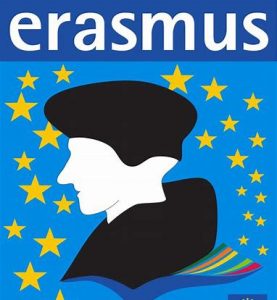
Once again Jens Holscher was awarded an ERASMUS grant to visit the University of Perugia (Italy). BU has a long established collaboration with colleagues in Perugia both in research and teaching. Jens will go there with PhD student Peter Howard-Jones to present a paper on Firm Productivity in the Western Balkans in their research seminar, which they recently published in Economic Annals. They will also give a series of lectures on Emerging Markets.
BU signs agreement with MMIHS in Nepal
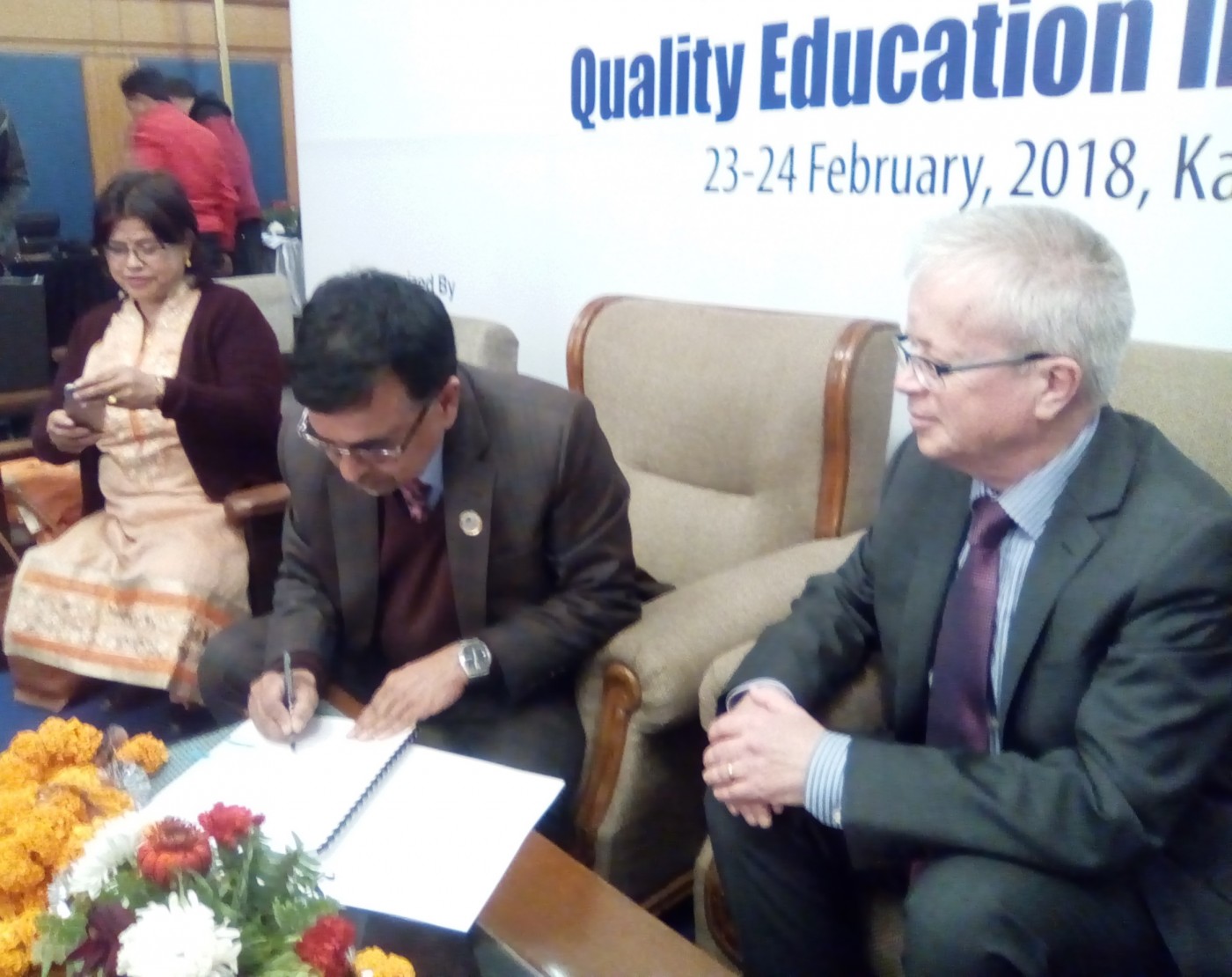 This weekend Manmohan Memorial Institute of Health Sciences (MMIHS) in Kathmandu, Nepal signed a Memorandum of Agreement (MoA) with Bournemouth University (BU).
This weekend Manmohan Memorial Institute of Health Sciences (MMIHS) in Kathmandu, Nepal signed a Memorandum of Agreement (MoA) with Bournemouth University (BU).  The ceremonial signing took place on the final day (24th Feb.) of the International Conference on Quality Education in Federal Nepal. Prof. Stephen Tee, who also spoke at the conference, represented our university.
The ceremonial signing took place on the final day (24th Feb.) of the International Conference on Quality Education in Federal Nepal. Prof. Stephen Tee, who also spoke at the conference, represented our university.
 The UoA formalises a long-standing collaboration between the two institutions. MMIHS and BU academics have jointly applied for research grants, conducted collaborative research and published together. Several BU staff [1-3] and students [4] in the Faculty of Health & Social Sciences have published in the Journal of Manmohan Memorial Institute of Health Sciences, an Open Access journal. Moreover, Prof. Edwin van Teijlingen in the Centre for Midwifery, Maternal and Perinatal Health has been a Visiting Professor at MMIHS for nearly a decade and has given several guest lectures over the years to staff and students at MMIHS.
The UoA formalises a long-standing collaboration between the two institutions. MMIHS and BU academics have jointly applied for research grants, conducted collaborative research and published together. Several BU staff [1-3] and students [4] in the Faculty of Health & Social Sciences have published in the Journal of Manmohan Memorial Institute of Health Sciences, an Open Access journal. Moreover, Prof. Edwin van Teijlingen in the Centre for Midwifery, Maternal and Perinatal Health has been a Visiting Professor at MMIHS for nearly a decade and has given several guest lectures over the years to staff and students at MMIHS.
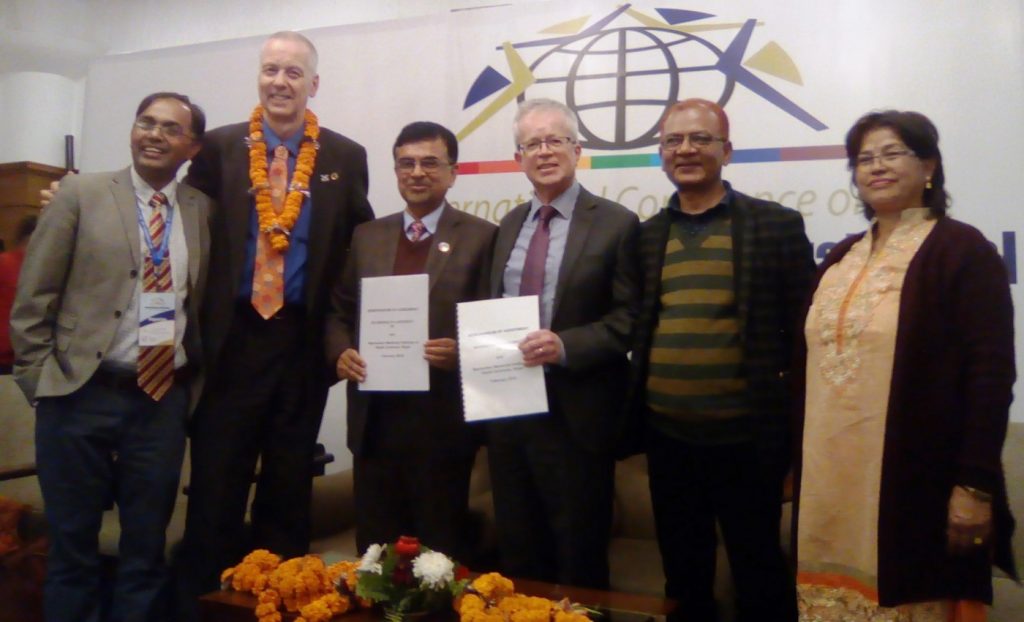
References:
- van Teijlingen, E., Simkhada, P., Luce, A., Hundley, V. (2016) Media, Health & Health Promotion in Nepal, Journal of Manmohan Memorial Institute of Health Sciences 2(1): 70-75. http://www.nepjol.info/index.php/JMMIHS/article/view/15799/12744
- Regmi, P., van Teijlingen, E., Simkhada, P, Kurmi, O, Pant, P. (2017) What can we learn from the Nepal Health Facility Survey 2015? Journal of Manmohan Memorial Institute of Health Sciences 3(1): 1-5.
- van Teijlingen, E., Marahatta, S.B., Simkhada, P., McIver, M., Sharma, J.P. (2017) Developing an international higher education partnerships between high & low-income countries: two case studies Journal of Manmohan Memorial Institute of Health Sciences, 3(1): 94-100.
- Vickery, M. van Teijlingen, E., (2017) Female infanticide in India and its relevance to Nepal Journal of Manmohan Memorial Institute of Health Sciences (JMMIHS) 3(1): 79-85.
Upcoming SURE conference – Student case study (Abigail Cox)
Abigail Cox is in her final year of Television Production in the Faculty of Media and Communication and is participating in the upcoming Showcasing Undergraduate Research Excellence (SURE) conference on 7 March 2018.
“I was inspired to submit an abstract to SURE as it looked like a great opportunity to showcase my research and also to develop my public speaking and communication skills,” says Abigail.
Her research explores the representation of refugee in contemporary documentary and current affairs reporting. “I have always followed the refugee crisis in the news. It is an incredibly important issue within humanity today, which is often not helped by negative media representation of the refugees themselves.”
Abigail was inspired by the BBC 2 series Exodus: Our Journey to Europe, “After watching this TV series, I knew that I had to use it as a case study,” she says. “I wanted to explore the key reoccurring representational themes within contemporary documentary and current affairs broadcasts which highlight the refugee crisis. This series offers new modes of documentary filmmaking which challenge the existing perceptions of refugees.”
“Overall, I think SURE is a great way to showcase work, especially to a wide variety of people. SURE offers students a chance to discuss their research with people outside of their faculty or programme, which is perhaps an opportunity we would not normally have.”
The Showcasing Undergraduate Research Excellence conference will taking place on 7 March 2018. Many undergraduate students from across the university will be presenting their research throughout the conference in a variety of different ways, from presentations to posters and art installations. Please register via the Eventbrite page if you would like to attend.
For more details, visit the SURE website or email the SURE team.
Voting is now open for the Research Photography Competition!
The Research Photography Competition is a great way for academics and student researchers to capture and share the excellent research undertaken at BU. Each year, the competition has a different theme which can be interpreted in any way, and this year’s theme is people.
It’s down to you, the public, to vote for your favourite image which will determine the top 3 winners of this year’s Research Photography Competition. Voting closes at 4pm on Monday 12 March.
Click here to go to the voting web page.
All photo submissions will be exhibited in the Atrium Art Gallery on Talbot Campus from 20-30 March 2018 and is an opportunity to find out about the research behind each photo in much more detail.
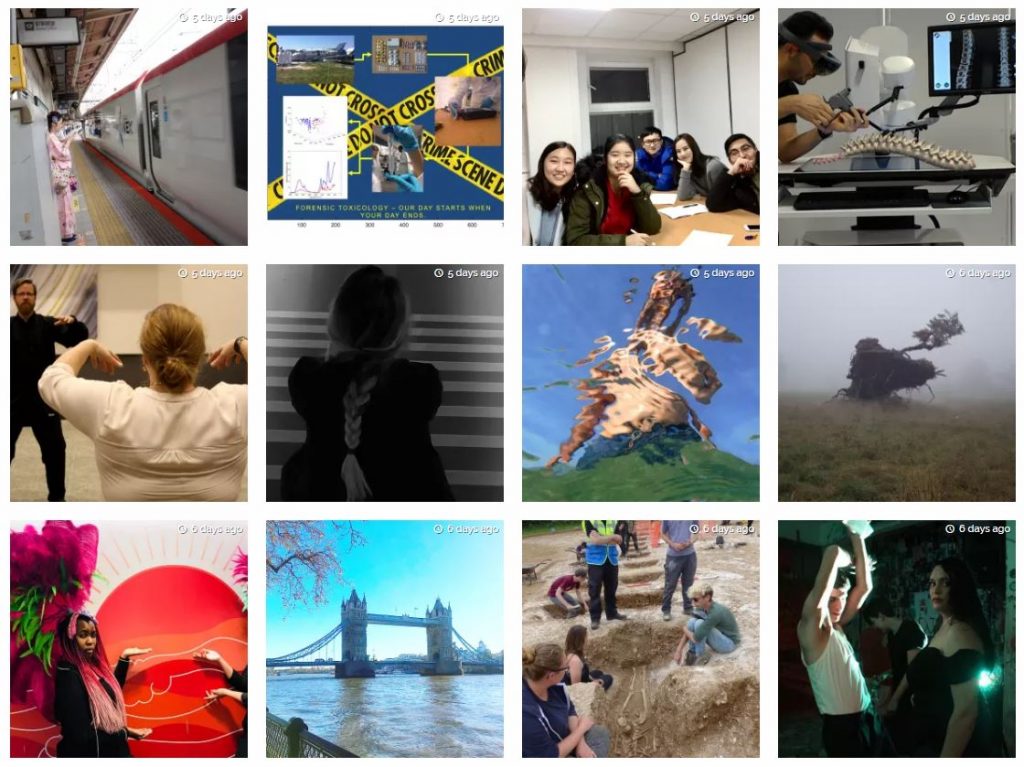
You can take a look at our Photo of the Week on the research website for previous year’s entries and the research behind their photos.
Let the best photo win!
Publishing’s Ratner moment: why eBooks are not ‘stupid’
By Bronwen Thomas, Bournemouth University
In the days before social media – and, presumably, media training – Gerald Ratner’s description of some of the products sold in his chain of jewellers as “total crap” became a byword for the corporate gaffe. Recently the chief executive of publisher Hachette Livre, Arnaud Nourry, seems to have suffered his own “Ratner moment” when he described ebooks in an interview with an Indian news site as a “stupid product”.
The interview, which was intended to address the future of digital publishing and specific issues facing the Indian publishing market, was widely misquoted and Nourry’s comments taken out of context. But there is no denying the fact that the publisher criticises his own industry (“We’re not doing very well”) and attacks ebooks for lacking creativity, not enhancing the reading experience in any way and not offering readers a “real” digital experience.
Some commenters on social media welcomed Nourry’s comments for their honesty. They highlight his seeming support for the idea that publishers should be championing writers and artists working to exploit the creative potential of digital formats to provide readers with experiences that may be challenging and disruptive, but also exhilarating and boundary pushing.
'Ebooks are stupid.' Terrifically interesting interview with CEO of Hachette on https://t.co/7q3JKcLM0z: https://t.co/EaXdLSVhgq @ambientlit @joannae @ProffJon @tomabba
— Kate Pullinger (@katepullinger) February 19, 2018
But many of the 1,000-plus commenters reacting to coverage of the story on The Guardian’s website spoke out against “fiddling for the sake of it” – claiming they were not interested in enhanced features or “gamified dancing baloney” borrowed from other media. They also listed the many practical enhancements that ebooks and ereaders do offer. The obvious one is the ability to instantly download books in remote locations where there are no bricks and mortar bookstores. But there are other less obvious enhancements, including being able to instantly access dictionary and encyclopedia entries (at least if you have wifi access) and the option to have the book read to you if you have visual impairments.
Elsewhere, Australian researcher Tully Barnett has shown how users of Kindle ereaders adapt features such as Highlights and Public Notes for social networking, demonstrating that even if ebooks are not that intrinsically innovative or creative, that doesn’t necessarily mean that they can’t be made so by imaginative users.
Nourry clearly isn’t averse to the provocative soundbite – in the same interview he went on to say: “I’m not a good swallower” when asked about mergers and conglomeration in the publishing industry. On the other hand, he also seems very aware of the special place of books and reading in “culture, education, democracy” – so his use of the word “stupid” in this context is particularly inflammatory and insensitive.
Dear reader
My research on digital reading has taught me that debating books vs ereaders is always likely to arouse strong passions and emotions. Merely mentioning the word Kindle has led in some instances to my being shouted at – and readers of “dead tree” books are rightly protective and passionate about the sensory and aesthetic qualities of physical books that the digital version possibly can’t compete with.
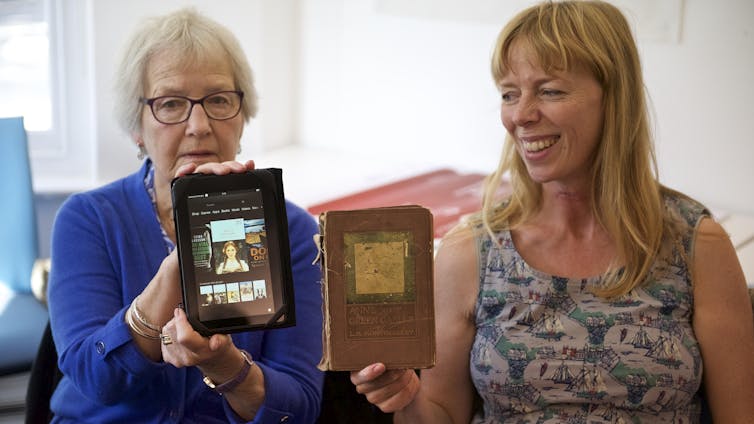
Mother and daughter Barbara and Jenni Creswell enjoyed Anne of Green Gables in both print and ebook format. Ray Gibson, Author provided
But, equally, my research has shown that enhancements in terms of accessibility and mobility offer a lifeline to readers who might not be able to indulge their passion for reading without the digital.
In my latest project, academics from Bournemouth and Brighton universities, in collaboration with Digitales (a participatory media company), worked with readers to produce digital stories based on their reading lives and histories. A recurring theme, especially among older participants, was the scarcity of books in their homes and the fact that literacy and education couldn’t be taken for granted. Our stories also demonstrated how intimately reading is connected with self-worth and helps transform lives disrupted by physical and mental health issues – making comments about any reading as “stupid” particularly damaging and offensive.
I would like to know if Nourry would still call ebooks stupid products after watching Mary Bish’s story: My Life in Books from our project. A lifelong reader who grew up in a home in industrial South Wales with few books, Mary calls her iPad her “best friend” and reflects how before the digital age her reading life would have been cut short by macular degeneration.
As well as demonstrating that fairly basic digital tools can be used to create powerful stories, our project showed that the digital also makes us appreciate anew those features of the physical book we may take for granted, the touch, smell and feel of paper and the special place that a book handed down from generation to generation has in the context of family life.
Bronwen Thomas, Professor of English and New Media, Bournemouth University
This article was originally published on The Conversation. Read the original article.
Research Professional – all you need to know
 Every BU academic has a Research Professional account which delivers weekly emails detailing funding opportunities in their broad subject area. To really make the most of your Research Professional account, you should tailor it further by establishing additional alerts based on your specific area of expertise. The Funding Development Team Officers can assist you with this, if required.
Every BU academic has a Research Professional account which delivers weekly emails detailing funding opportunities in their broad subject area. To really make the most of your Research Professional account, you should tailor it further by establishing additional alerts based on your specific area of expertise. The Funding Development Team Officers can assist you with this, if required.
Research Professional have created several guides to help introduce users to ResearchProfessional. These can be downloaded here.
Quick Start Guide: Explains to users their first steps with the website, from creating an account to searching for content and setting up email alerts, all in the space of a single page.
User Guide: More detailed information covering all the key aspects of using ResearchProfessional.
Administrator Guide: A detailed description of the administrator functionality.
In addition to the above, there are a set of 2-3 minute videos online, designed to take a user through all the key features of ResearchProfessional. To access the videos, please use the following link: http://www.youtube.com/researchprofessional
Research Professional are running a series of online training broadcasts aimed at introducing users to the basics of creating and configuring their accounts on ResearchProfessional. They are holding monthly sessions, covering everything you need to get started with ResearchProfessional. The broadcast sessions will run for no more than 60 minutes, with the opportunity to ask questions via text chat. Each session will cover:
-
Self registration and logging in
-
Building searches
-
Setting personalised alerts
-
Saving and bookmarking items
-
Subscribing to news alerts
-
Configuring your personal profile
Each session will run between 10.00am and 11.00am (UK) on the fourth Tuesday of each month. You can register here for your preferred date:
These are free and comprehensive training sessions and so this is a good opportunity to get to grips with how Research Professional can work for you.
Have you noticed a new box appear on the BU Research Blog homepage?
 By clicking on this box, on the left of the Research Blog home page just under the text ‘Funding Opportunities‘, you access a Research Professional real-time search of the calls announced by the Major UK Funders. Use this feature to stay up to date with funding calls. Please note that you will have to be on campus or connecting to your desktop via our VPN to fully access this service.
By clicking on this box, on the left of the Research Blog home page just under the text ‘Funding Opportunities‘, you access a Research Professional real-time search of the calls announced by the Major UK Funders. Use this feature to stay up to date with funding calls. Please note that you will have to be on campus or connecting to your desktop via our VPN to fully access this service.
BU professor invited to speak at British embassy in Kathmandu
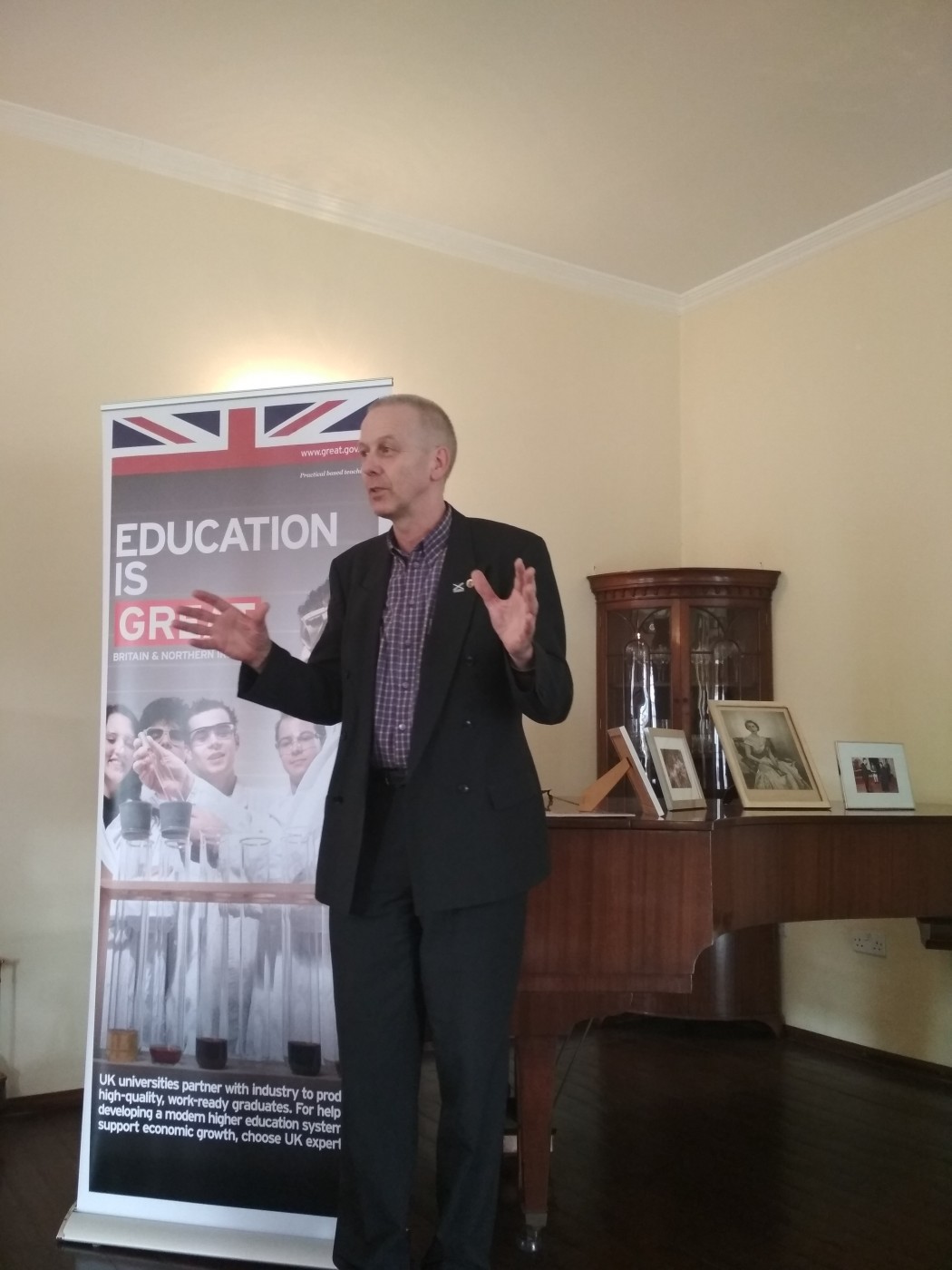 The British Ambassador to Nepal Richard Morris hosted the launch of a report of a market study of Nepal’s education sector today (28th February) in his Kathmandu Residence. The report was commissioned to help support UK service providers who are looking for education opportunities in Nepal. The Ambassador invited Bournemouth University’s Prof. Edwin van Teijlingen to highlight the UK’s expertise in research, as well as to share his own experience in UK-Nepal partnerships/ collaborations in education.
The British Ambassador to Nepal Richard Morris hosted the launch of a report of a market study of Nepal’s education sector today (28th February) in his Kathmandu Residence. The report was commissioned to help support UK service providers who are looking for education opportunities in Nepal. The Ambassador invited Bournemouth University’s Prof. Edwin van Teijlingen to highlight the UK’s expertise in research, as well as to share his own experience in UK-Nepal partnerships/ collaborations in education. 
Prof. Edwin van Teijlingen is Visiting Professor at colleges in Nepal: (1) Nobel College, affiliated with Pokhara University; and (2) Manmohan Memorial Institute of Health Sciences, affiliated with Tribhuvan University.
Interdisciplinary Research Week 2018

The third Interdisciplinary Research Week (IRW) is being held from 19th to 23rd March 2018. Join us to celebrate the breadth and excellence of Bournemouth University’s interdisciplinary research, and stimulate new collaborations and ideas amongst the University’s diverse research community.
The week-long event includes a programme of lectures, workshops, and discussions, aimed at promoting interdisciplinary workings; to provide an understanding of how to get involved in Interdisciplinary Research.
Programme
Inspirational Speaker – Professor Celia Lury
British Academy Visit – Interdisciplinary Research
Collaborating with Others: Becoming a Better Team worker
Networking: Making the Most of an Upcoming Event
New research realities and interdisciplinarity
Interdisciplinary research with industry
Lighting Talks: What can and should be achieved in Interdisciplinary Research
The 10th Annual Postgraduate Research Conference – 1 Week to Go!
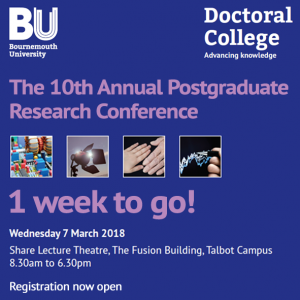 The Doctoral College kindly invites you to attend the 10th Annual Postgraduate Research Conference taking place in the Fusion Building, Talbot Campus.
The Doctoral College kindly invites you to attend the 10th Annual Postgraduate Research Conference taking place in the Fusion Building, Talbot Campus.
Click to Register
The Annual Postgraduate Research Conference is an opportunity to listen to and engage with current postgraduate research taking place at BU. Organised and hosted by the Doctoral College this cross-faculty and interdisciplinary conference supports postgraduate researchers at all stages in presenting their research to their peers and colleagues across BU.
There will be oral, poster and photography presentations taking place throughout the day with a networking opportunity at the end.
If you have any questions please email pgconference@bournemouth.ac.uk. We look forward to seeing you.












 Postgraduate Research Experience Survey (PRES) 2024 – Closing today
Postgraduate Research Experience Survey (PRES) 2024 – Closing today THE INNOVATION COMMON ROOM: Going Old School
THE INNOVATION COMMON ROOM: Going Old School Cybersecurity Learning through Game-Based Mechanisms
Cybersecurity Learning through Game-Based Mechanisms Nepal Study Days 2024
Nepal Study Days 2024 We can help promote your public engagement event or activity
We can help promote your public engagement event or activity Funded Public Engagement Opportunity – ESRC Festival of Social Science 2024 -Deadline for Applications Thursday 16 May
Funded Public Engagement Opportunity – ESRC Festival of Social Science 2024 -Deadline for Applications Thursday 16 May MSCA Postdoctoral Fellowships 2024
MSCA Postdoctoral Fellowships 2024 Horizon Europe News – December 2023
Horizon Europe News – December 2023